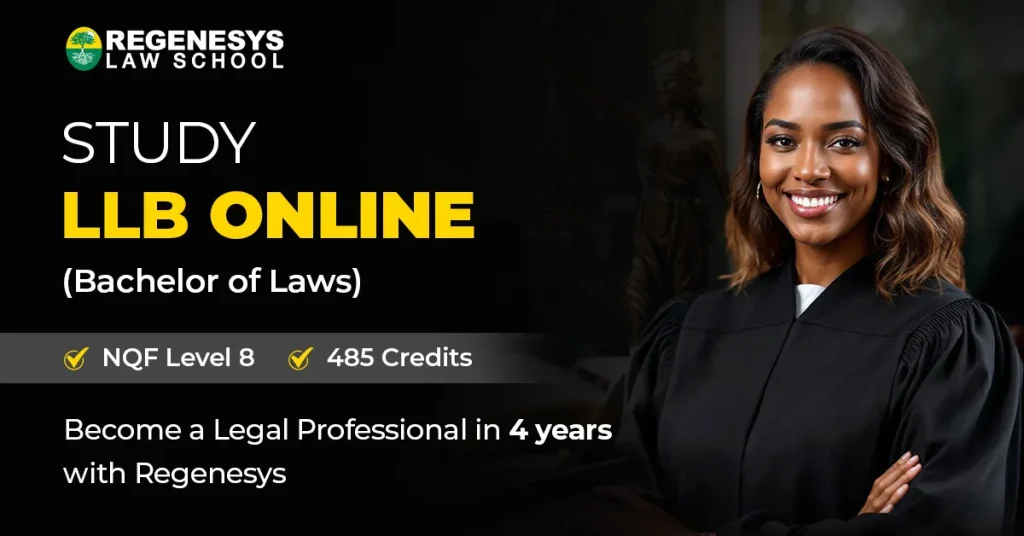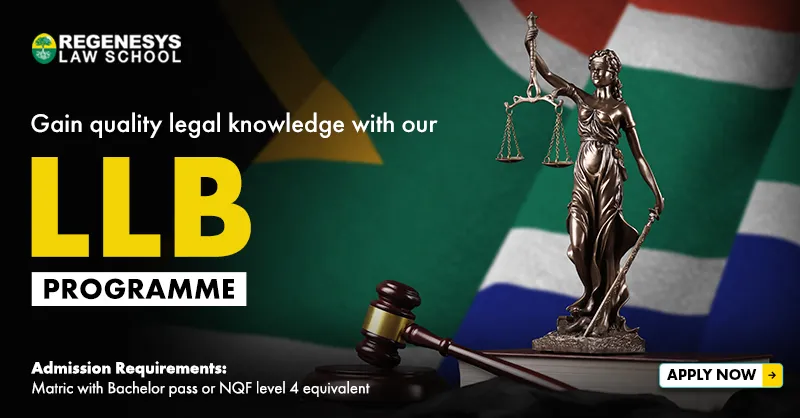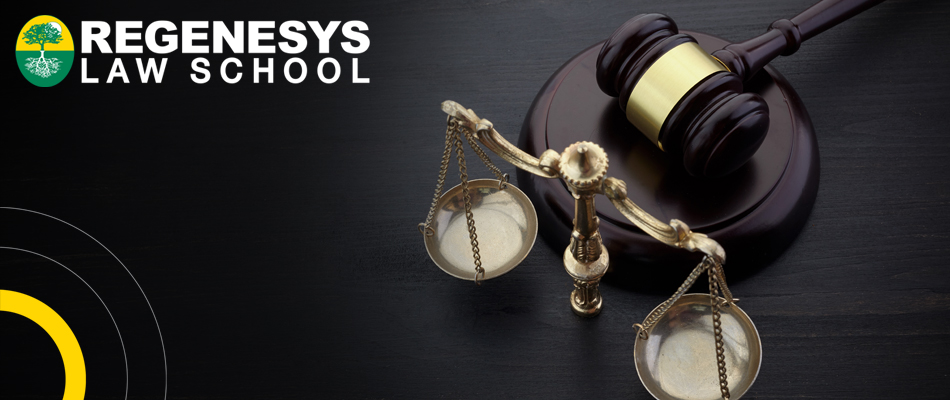Are you thinking about pursuing a career in law? The legal profession remains one of the most respected and rewarding career paths, offering opportunities in courts, corporate offices, government, and international organisations. In South Africa, the journey begins with earning a recognised law degree, most commonly the Bachelor of Laws (LLB). However, with so many degree types and universities to choose from, deciding on the right path can feel overwhelming.
Fortunately, there are clear pathways into the profession, whether you pursue an LLB directly or begin with another undergraduate degree that includes law as a major.
In this article, you will learn about the qualifications required to practise law in South Africa, the differences between an LLB, BA Law, and BCom Law, how long it takes to qualify, and how to choose the right university for your studies.
Table of Contents

Practising law in South Africa
To practise as a lawyer in South Africa, you must hold an LLB degree from an accredited institution. Accreditation is important; make sure the degree you choose is registered with the South African Qualifications Authority (SAQA) and approved by the Council on Higher Education (CHE). Every approved degree has a unique SAQA ID, which you can verify online.
The LLB is a four-year undergraduate degree designed to provide both the theoretical foundation and practical understanding of South African law. While the structure may vary between institutions, all programmes are aligned with the CHE’s learning outcomes to ensure graduates are adequately prepared for professional training.
Once you have completed your LLB, the process does not end there. You must serve two years of articles (practical training) under a practising attorney, and then write the relevant professional board exams before being admitted as an attorney or advocate.
Is an LLB degree the only way to get to practice law?
The LLB is the most direct and common route to legal practice, but it is not the only one.
If you already hold an undergraduate degree, you may still apply for an LLB. Depending on the subjects you studied, you may be required to start from the first year, or in some cases, be granted credits for law-related modules completed earlier.
Students who hold a BCom Law, BA Law, or even a degree in another discipline can complete a truncated LLB. This usually takes an additional two years on top of their first degree. While this path takes longer (around five to six years in total), it offers the advantage of broader academic exposure.
This route is particularly attractive if you want to pair law with another strong foundation, such as business, social sciences, or humanities, before specialising in law.
Read more on LLB Programme in South Africa: Career, Fees & Subjects here!

Which is better – a BA Law or a BCom Law?
Before deciding between a BA Law and a BCom Law, it’s important to understand that neither degree makes you a lawyer on its own. Both provide an excellent foundation and can serve as stepping stones into a full LLB, but the right choice depends on your career interests and academic strengths.
Here’s how they differ:
BCom Law
- Focuses strongly on the commercial and business aspects of law.
- Covers key legal subjects like family law, criminal law, succession law, law of persons, and constitutional law.
- Can be combined with majors such as taxation, management, accounting, financial management, or investment management.
- Well-suited for students who aim to enter corporate law, tax law, or commercial litigation.
BA Law
- Offers a broader focus on humanities and social sciences, with law as a central component.
- Students may study politics, psychology, sociology, criminology, or languages alongside core law modules.
- Best suited for those interested in human rights law, constitutional law, family law, or international law.
Both degrees give you credits that can often be transferred into your LLB, making your transition smoother. The choice between them should be based on whether you are more inclined towards the commercial/business world or the social sciences/humanities.
Which Bachelor’s Degree is Best for Law?
If your goal is to qualify as a lawyer as quickly as possible, the LLB is the most efficient choice. It is designed specifically to prepare students for practice in just four years.
However, if you want flexibility and a broader background, a BA Law or BCom Law can be a great starting point. These degrees allow you to explore areas outside of law while still laying a foundation in legal studies. After completing one of these, you can transition into an LLB and complete it in a shorter timeframe than starting from scratch.
Ultimately, the “best” degree depends on your career aspirations:
- Choose LLB if you want the fastest route to legal practice.
- Choose BCom Law if you are interested in corporate law and business-related practice.
- Choose BA Law if you are drawn to human rights, public service, or international law.
No matter which degree you start with, remember that the LLB is non-negotiable for admission as an attorney or advocate in South Africa.
Read more on Types of Law Degrees Available in South Africa here!
Which University is Best for Law?
Choosing the right university is just as crucial as choosing the right degree. A good law school does more than deliver content — it shapes your professional skills, opens doors to networking opportunities, and prepares you for the realities of legal practice.
Here are key factors to consider when selecting a university:
- Accreditation: Always confirm CHE approval and SAQA registration.
- Specialisation options: Some universities offer electives in niche areas such as corporate governance, international law, or human rights. Look for the ones you would like to choose.
- Practical exposure: Look for institutions that include mock trials, legal clinics, or internship opportunities.
- Reputation and alumni outcomes: Strong law schools often have a track record of graduates excelling in the profession.
- Learning environment: Consider class sizes, lecturer expertise, and access to online or flexible learning if needed.
For students aiming for a career in law, Regenesys Law School’s LLB programme is an excellent choice. It combines a robust legal curriculum with practical, real-world activities, preparing graduates to confidently enter the profession. With personalised support, flexible online learning, and opportunities to apply legal concepts in practice, Regenesys equips aspiring lawyers with the skills and experience needed to succeed.

Explore Our Other Programmes
Conclusion
Choosing the right law degree and institution is a crucial step in building a successful legal career. Whether you opt for an LLB for the most direct route to practising law, or begin with a BA or BCom Law to gain a broader foundation, what matters most is selecting a programme that equips you with both theoretical knowledge and practical skills.
Regenesys Law School’s LLB programme is designed with this in mind. It not only provides a strong legal curriculum but also integrates real-life activities to develop the skills you need as a modern legal professional. With personalised support, flexible learning options, and opportunities to apply what you learn, it prepares you to stand out in the competitive legal field.
Take the next step in your legal journey – enrol in Regenesys’ LLB programme today and start building the foundation for a rewarding law career.
FAQs
What is the best bachelor’s degree to pursue for a law career in law in South Africa?
The best bachelor’s degree for a law career in law in South Africa is the Bachelor of Laws (LLB). This degree is specifically designed to provide comprehensive legal education and is the most direct route to becoming a lawyer.
Can I study a different bachelor’s degree before pursuing an LLB in South Africa?
Yes, you can study a different bachelor’s degree, such as a Bachelor of Arts (BA) or Bachelor of Commerce (BCom), before pursuing an LLB. Many students choose to complete a first degree in a related field and then enrol in a postgraduate LLB programme.
What are the advantages of pursuing a BA or BCom before an LLB?
Pursuing a BA or BCom before an LLB can provide a broader educational foundation and develop critical thinking and analytical skills. Degrees in these fields can offer valuable knowledge in areas such as economics, politics, and sociology, which are beneficial in legal studies.
How long does it take to complete an LLB in South Africa if I already have a bachelor’s degree?
If you already have a bachelor’s degree, completing a postgraduate LLB typically takes two to three years. This duration may vary depending on the university and the specific programme structure.
Are there any specific high school subjects that are recommended for students planning to pursue law in South Africa?
While there are no mandatory high school subjects for law, it is recommended to focus on subjects like English, History, and Business Studies. These subjects help develop skills in writing, analysis, and critical thinking, which are essential for legal studies.







